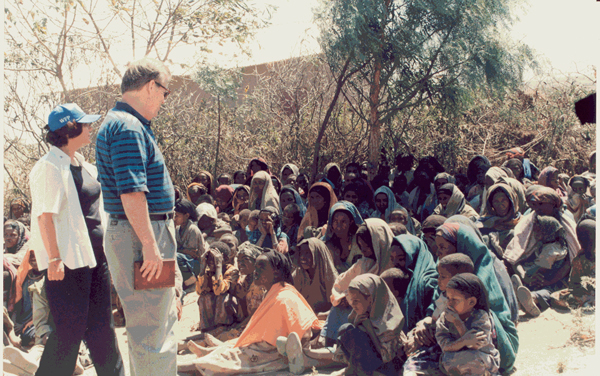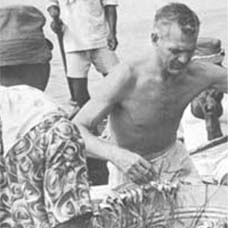
U.S. is slashing world food aid contributions
U.S. is slashing world food aid contributions
Disasters, emergencies hit amid budget deficits; Resources diverted, delayed; Hardest-hit are programs of long-term development
By John Murphy
Sun Foreign Staff
Originally published December 19, 2004
JOHANNESBURG, South Africa - Crop failures in Afghanistan, conflict in Sudan and a half-dozen other humanitarian disasters have sharply increased demands on the United States' food aid program, forcing the American government to cancel food shipments and scale back donations to some of the world's neediest countries.
The United States historically uses its abundant agricultural riches to provide half, and sometimes more, of the aid needed to feed the world's hungry.
But a threefold increase in emergency food demands this year, a soaring U.S. deficit and tight budget restrictions are making it impossible for the United States to fulfill its aid commitments.
The U.S. Agency for International Development, which oversees the distribution of most American food aid through its Food for Peace program, is wrestling with an estimated $650 million shortfall. To make up for the gap in funds, AID is diverting resources from long-term development food assistance programs, which address the health and food needs of millions of people suffering from chronic hunger.
Since last month, AID has canceled or delayed dozens of food orders placed by humanitarian agencies to support a long list of programs. Those include the feeding of orphans and vulnerable children, nutrition for AIDS patients and health care for mothers and infants.
"We tried not to hold back on everybody. We are trying to keep the pipeline intact," said Roger Winter, an AID assistant administrator for the bureau overseeing the Food for Peace program.
Winter said that because of a "substantial food aid shortfall," AID postponed paying for about 20 new development projects and delayed payments for some existing programs.
Although the food shipments might resume soon, he did not know whether there would be additional cancellations or delays because of the lack of funds.
Baltimore-based Catholic Relief Services, one of the world's largest distributors of food aid, anticipates that the cuts to its development programs will leave more than 1.5 million orphans, disabled and AIDS victims without food assistance. The sudden cutoff of AID support could also leave as many as 1.2 million children without schooling, more than 1.2 million mothers and infants without critical nutrition and about 1.6 million farmers without deliveries of farm tools.
So far, AID has canceled shipments of 12,860 metric tons of food destined for CRS development programs in Indonesia, Eritrea and Malawi. It delayed the delivery of 85,640 metric tons to a dozen emergency and non-emergency programs in Africa and South and Central America, CRS officials said.
"Millions of people will be affected by this," Ken Hackett, president of CRS, said in a statement read by an aide. "By taking away this safety net, we will be abandoning them."
Save the Children USA reports that the American cutbacks have delayed food shipments to Nicaragua. They have also forced Save the Children to put several development programs on hold in Africa and slash its food operations in Tajikistan, Central Asia, by 50 percent.
"I just returned from Angola, where drought has devastated many coastal communities," said Ina Schonberg, director of food security programs for Save the Children, in a statement. "Families are down to one meal a day. We've been told that additional food resources will not be available to help these families."
U.N. program affected
The United Nations World Food Program, which in the past has received more than 50 percent of its funds from the United States, is now bracing for unprecedented cuts in financial support for its non-emergency operations, according to a U.S. food aid official who did not wish to be named. It now is seeking donations from China, Russia and India, the official said.
In southern Africa, the World Food Program's appeal for $171 million to feed 2.8 million people has so far generated only $11.5 million in donations. Food stockpiles will begin running out next month in Lesotho, one of the hardest-hit countries with half a million people in need of food aid. No money has yet come from the United States, WFP officials said.
"There are less food aid resources in the United States, and there are huge demands because of Sudan. ... That's why we face the problem that we do. It's a much smaller cake to be divided," said Mike Sackett, World Food Program's regional director for southern Africa.
In relief and development work, financial support is always limited. Humanitarian agencies often face budget uncertainties or food supply delays because aid might be diverted in response to unanticipated disasters or because of a lack of donations. What makes this year's budget shortfall so serious, aid experts say, is its widespread impact on development projects and the fact there appears to be no relief in sight.
Budget constraints
"The budget deficit is so high, and the administration is trying to stop all increases other than those for defense and national security," said Ellen Levinson, executive director of Coalition for Food Aid, which represents private voluntary organizations such as CRS and Save the Children that depend on U.S. food aid for their programs. "With that kind of policy, we don't know how humanitarian programs will fare."
Each year, the U.S. government buys wheat, corn, rice and other commodities to alleviate hunger and poverty around the world. One of the largest food aid initiatives is the Food for Peace program, which over the past 50 years has kept billions of people from malnutrition and starvation.
The bulk of Food for Peace resources is used in nonemergency operations designed to solve chronic hunger problems. Some food is distributed directly to the hungry. Other food is sold on the local market, and the profits are used by the aid agencies to support development projects. Those include improving farming techniques, generating income for the poor and providing health care to mothers and infants.
In the Bush administration's 2005 budget, $1.183 billion was allocated for the Food for Peace program. Of that, $468 million was earmarked for emergencies and the rest for development assistance.
Many emergencies
But the past year has seen an unusual number of emergencies, increasing food aid demands by $832 million. In Sudan, 1.6 million people in the Darfur region are dependent on food aid after being driven from their homes by civil unrest. Crop failures in Afghanistan have left more than 6 million people there in need of food aid. Floods in Bangladesh, crop-eating locusts in West Africa and droughts in Ethiopia and Eritrea created additional demands.
"We can see an emergency coming, but we can't always tell the magnitude of it," said Winter, the AID assistant administrator.
Earlier this month, after requests from Congress and the aid community, the administration released 200,000 metric tons of wheat from an emergency food reserve known as the Bill Emerson Humanitarian Trust to meet increased demands in Sudan. Even with those emergency supplies, AID still has a $650 million shortfall.
Winter said it's possible that the trust could be tapped again. But with no clear indication of when or whether food shipments will resume to some parts of the world, humanitarian agencies are making plans to lay off employees and to tell beneficiaries that they cannot expect assistance this year.
Winter acknowledged that many of the people who receive non-emergency food assistance that has been canceled or delayed are as vulnerable as those living in many emergency situations. Getting assistance to them remained as much a priority for AID, he said, as for the humanitarian agencies.
"We are in sympathetic harmony with their concerns. We don't want to do damage," Winter said. "It's too early to say it's all doom and gloom."
In Malawi, Catholic Relief Services and other agencies recently launched a five-year effort to address some of the root causes of food insecurity. The project was designed to help 120,000 families by distributing food aid to the vulnerable and improving farming methods and sanitation.
But soon after the program was launched, CRS received word that the United States had cut its transportation assistance and canceled deliveries of 2,000 metric tons of corn and pinto beans.
"I was very surprised. This is an embarrassment," said Schuyler Thorup, Catholic Relief Services country representative in Malawi. "This is a rounding error as far as the U.S. budget is concerned ... and the damage is going to be very long-term and will undermine our credibility."
At a time when the United States is seeking to improve its image overseas, aid workers say, there might be no better way of building good will than through development assistance and food aid.
Cutting those programs will likely breed resentment, said Jennifer Overton, Catholic Relief Services country representative in Madagascar, who is making plans to halve her development programs. She says she dreads having to tell villagers the aid will not be arriving.
"There's no way to explain this to people. They don't think it's possible that the United States doesn't have resources."









